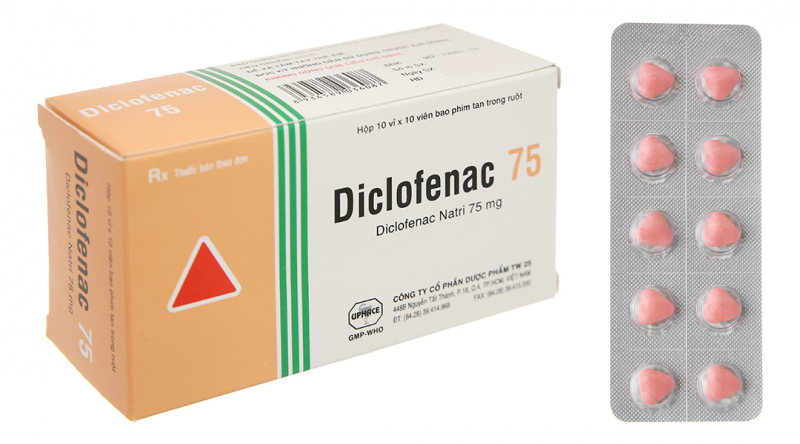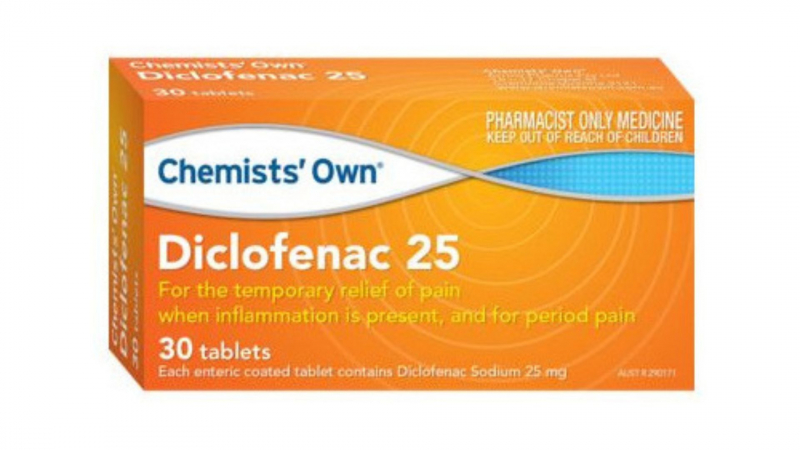Top 7 Things to Know About Diclofenac
Diclofenac is a nonsteroidal anti-inflammatory medicine (NSAID) used to treat pain and inflammatory conditions including gout. It is also marketed under the ... read more...trade names Voltaren and other names. It can be used topically, injected, or taken by mouth or rectally via a suppository. Pain relief can persist for up to eight hours. It can also be used in conjunction with misoprostol to lessen gastric issues. And here are some things to know about Diclofenac.
-
- Different types of pain or inflammatory diseases can be treated with diclofenac.
- Cyclooxygenase (COX) enzymes are the basis for how diclofenac works. This blocks the production of prostaglandins (prostaglandins elevate body temperature and make nerve endings more sensitive to pain transmission).
- Diclofenac is a member of the NSAID drug class (nonsteroidal anti-inflammatory drugs).

Photo: Google 
Photo: Medigoapp -
Benefits of Diclofenac is definitely one of the things know about Diclofenac.
- Musculoskeletal complaints, particularly arthritis, rheumatoid arthritis, polymyositis, dermatomyositis, osteoarthritis, dental pain, temporomandibular joint (TMJ) pain, spondyloarthritis, ankylosing spondylitis, gout attacks, and pain control for kidney and gallstones are all examples of inflammatory disorders. The management of acute migraines is a further indication. When inflammation is also present, diclofenac is frequently used to treat mild to severe postoperative or post-traumatic pain. It is particularly beneficial for treating endometriosis and menstrual pain.
- Diclofenac is also available topically, however it has only been found to be effective in treating osteoarthritis and not in treating other persistent musculoskeletal pain conditions.
- Additionally, it might be beneficial for actinic keratosis and acute discomfort brought on by mild sprains, strains, and contusions (bruises).
- Eye drops are available for purchase in several nations to treat both acute and persistent non bacterial inflammation of the eyes' anterior segments (e.g., postoperative states). Using diclofenac eye drops to treat severe corneal abrasion discomfort is another option.
- Diclofenac is frequently used to treat cancer-related chronic pain, particularly when inflammation is present. 32 grams of diclofenac gel should not be used per day.
- Used to treat mild to moderate acute pain brought on by rheumatoid arthritis and osteoarthritis.
- Possibly used to treat mild to moderate pain brought on by other factors.
- Reduces temperature and soothes inflammation.

Photo: Nhà Thuốc An Khang 
Photo: Vidipha -
You are more likely to have the following side effects if you are between the ages of 18 and 60, do not take any other medications, or have any other medical conditions:
- Adverse effects affecting the stomach, including indigestion, belching, heartburn, and bleeding. More susceptible groups include those who are older, take various stomach-affecting medications, or consume more than three glasses of alcohol every day. Compared to ibuprofen, diclofenac is more likely to have adverse effects that affect the stomach.
- Nausea, headaches, constipation, and water retention.
- There have been reports of additional adverse effects, such as tinnitus (ear ringing).
- The majority of NSAIDs have been linked to an elevated risk of catastrophic cardiovascular events like heart attack or stroke. Patients taking higher doses and those who already have cardiovascular disease may be at greater risk. In comparison to other NSAIDs like ibuprofen, diclofenac may carry a higher risk.
- May prolong bleeding, particularly if taken with other medications that also postpone blood clotting.
- Some patients, such as those with kidney illness, a history of stomach ulcers or other gastrointestinal diseases, or those who already have cardiovascular disease, may not be a good fit. During or after coronary artery bypass graft surgery, should not be administered.
- May have interactions with some other medications, including diuretics, SSRIs, ACE inhibitors, and warfarin.
- Due to the risk of fetal ductus arteriosus premature closure, NSAIDs like diclofenac should not be used in the final three months of pregnancy. Additionally, NSAID usage after 20 weeks of pregnancy may result in oligohydramnios (low amniotic fluid volume) and, in rare cases, renal damage in the developing fetus. Between 20 and 30 weeks of pregnancy, if NSAID medication is deemed required, utilize the lowest effective dose for the shortest amount of time. Do not take NSAIDs after 30 weeks of pregnancy.

Photo: Arnhem Physiotherapy Services 
Photo: Houston Hearing Center -
The following thing to know about Diclofenac is tips for using it.
- It's possible that different diclofenac formulations are not interchangeable; consult your doctor or pharmacist before switching medicines.
- Wear sunscreen SPF 30-50+ when outside and consult a doctor as soon as possible if you get a skin rash because it might make your skin more vulnerable to the sun.
- Should not be taken for extended periods, especially in elderly people.
- Periodic monitoring of liver enzymes and blood counts may be necessary.
- In the final three months of pregnancy, NSAIDs should not be taken; always consult your doctor before taking any drug.
- Do not take diclofenac if you previously suffered asthma-like symptoms, hives (urticaria), or other allergic-type responses after taking aspirin or other NSAIDs (like ibuprofen).
- Diclofenac with alcohol interaction may raise the risk of stomach bleeding or ulcers.
- In the latter three months of pregnancy, NSAIDs like diclofenac should not be taken; always see your doctor before taking any drug. Without consulting your doctor, avoid using NSAIDs like diclofenac between 20 and 30 weeks of pregnancy since they may result in the baby's birth with low amniotic fluid volumes and renal issues. During pregnancy, acetaminophen may be used to alleviate pain and inflammation.
Two to three times a day, you'll often take diclofenac tablets, capsules, or suppositories. Depending on what your doctor recommends for you, the typical dose ranges from 75 mg to 150 mg per day. As for how many times a day to take your medicines, heed your doctor's advice. When determining the appropriate dose of diclofenac for your child, your doctor will take into account their weight. Your doctor could suggest slow-release diclofenac tablets or capsules if you experience constant pain. These are often taken twice daily or once daily in the evening. The interval between doses if you take slow-release diclofenac twice daily should be between 10 and 12 hours.

Photo: GoodRx 
Photo: Bellambi Drive Thru Pharmacy -
When used with diclofenac, certain medications may either lessen the drug's impact, shorten its duration of action, exacerbate adverse effects, or have no effect at all. Even while it is not always necessary to cease taking one of the drugs, sometimes there is an interaction between two drugs. Consult your doctor to learn how to handle drug interactions.
Drinking alcohol while taking diclofenac may raise the risk of renal damage or side effects involving the gastrointestinal tract.
Typical drugs with which Diclofenac may interact are:- ACE inhibitors or ARBs, such as captopril, enalapril, or losartan
- Antibiotics, such as ciprofloxacin or vancomycin
- Anticoagulants (blood thinners) such as apixaban, dabigatran, fondaparinux, heparin, or warfarin
- Antidepressants, such as citalopram, escitalopram, fluoxetine, or paroxetine
- Antifungals, such as voriconazole
- Beta blockers, such as acebutolol, atenolol, bisoprolol, or carvedilol
- Bisphosphonates, such as alendronate
- Diuretics (water pills), such as chlorthalidone, chlorothiazide, or hydrochlorothiazide
- HIV medications (eg, Stribild, tenofovir)
- Other nonsteroidal anti-inflammatories (NSAIDs), such as celecoxib, etodolac, ibuprofen, ketorolac, meloxicam, nabumetone, or naproxen
- Sulfonylureas (a type of diabetes medication), such as glimepiride, glyburide, or glipizide
- Supplements, such as glucosamine, omega-3 fatty acids, vitamin E
- Others, such as cyclosporine, lithium, methotrexate, pemetrexed, pirfenidone, or tacrolimus.
- Sleeping pills, such as zolpidem
- Some medications used to treat mental illness, such as clozapine and thioridazine
- Theophylline

Photo: ยาต้านไวรัส 
Photo: Dr Vitamin -
To end the list of things about Diclofenac, we want to mention some cautions for pregnancy and breastfeeding. Diclofenac is often not advised during pregnancy. This is due to the possibility that diclofenac could harm your unborn child. For instance, it might impair your baby's blood flow or result in insufficient amniotic fluid around your fetus in the pregnancy. When you are pregnant, your doctor will only recommend that you take diclofenac if the advantages much outweigh the hazards. Other medical procedures might be safer for you. Generally speaking, paracetamol is the best pain reliever to use while pregnant.
Diclofenac is safe to use when nursing. Only a tiny fraction enters breast milk, therefore your infant is unlikely to have any negative consequences. It has been used successfully by many nursing mothers. Talk to your midwife, health visitor, pharmacist, or doctor as soon as you can if you find that your baby is not feeding as well as normal or if you have any other worries about your baby.

Photo: Science News 
Photo: Pampers






























